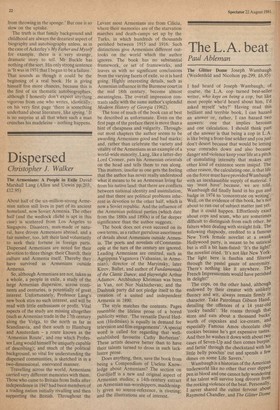The L.A. beat
Paul Ableman
The Glitter Dome Joseph Wambaugh (Weidenfeld and Nicolson pp.299, 6.95) I had heard of Joseph Wambaugh, of course, the L.A. cop turned best-seller writer, who kept on being a cop, but like most people who'd heard about him, I'd asked myself 'why?' Having read this brilliant and terrible book, I can hazard an answer or, rather, I can hazard two answers: one that implies heroism and one calculation. I should think part of the answer is that being a cop in L.A. is like being a front-line soldier and you just don't desert because that would be letting your comrades down and also because danger and violence keep your life at a pitch of stimulating intensity that makes any other kind of existence seem insipid. The other reason, the calculating one, is that life on the force must haveprovidedWambaugh with an inexhaustible supply of material. I say 'must have' because, we are told, Wambaugh did finally hand in his gun and badge in 1974 to 'concentrate on writing'. Well, on the evidence of this book, he's not about to run out of subject matter just yet.
But it could happen. Effortlessly exact about cops and scum, who are sometimes difficult to distinguish from each other, he falters when dealing with straight folk. The following rhapsody, credited to a famous New York female novelist at a swank Hollywood party, is meant to be satirical but is still a bit ham-fisted: 'It's the light!' the novelist cried. 'It's not like New York. The light here is fuschia and filtered through the pastel gauze of anonymity. There's nothing like it anywhere. The French Impressionists would have perished in delight!' The cops, on the other hand, although endowed by their creator with unlikely fluency and wit, always remain firmly In character. Take Patrolman Gibson Hand, detailing the offences of a 14 year-old 'cooky bandit': 'He roams through that store and eats about a thousand bucks worth of cupcakes and ice-cream, and especially Famous Amos chocolate chill cookies because he's got expensive tastes. And then he washes it down with about two, cases of Seven-Up and then comes burpih and fartin' through the checkstand with his little belly poochin' out and spends a feW dimes on some Life Savers.' Wambaugh is a historian of the American underworld like no other that ever dipped pen in blood and one cannot help wondering if his talent will survive long divorce from the reeking violence of the beat. Personally, I never shared the cultist fervour about Raymond Chandler, and The Glitter Dome makes Chandler's work seem contrived and remote. Cops, rather than the more fashionable private eyes, are the ones up to their holsters in American crime.
The Glitter Dome is a rambling account — although the detours ultimately converge — of an investigation into the murder of a Hollywood mogul. It features three twoman police teams. There are the 'street monsters', Buckmore Phipps, the white one, and Gibson Hand, the negro, always looking for 'opportunities to kill people and do other good police work'. There are 'The Weasel' and 'The Ferret', narcotics sleuths, normally dressed like seedy hippies but who, on a long car tail, sometimes have to resort to a female wig and cuddling to deceive the pursued suspect. And there are the real heroes: Al Mackey and Martin Welborn, a pair of homicide detectives in Charge of the case. These two are brilliantly realised. Mackey is emaciated and worried sick about the signs of impending breakdown that Welborn is unconsciously transnutting. Welborn is an ex-seminarist, too thin-skinned for the everyday horrors, and the occasional giant horror, that lurk at the end of routine radio-calls. Both of them are divorced. Both are in desperate need of a holiday and the love of a good woman. Both live on the brink of despair and suicide. Mackey's speciality is 'solving' murders by rigging evidence to make them look like suicides. Welborn's is sound deductive thinking.
There is no way Nigel St Claire's murder can be fitted-out to look like suicide. He was found shot in the front seat of a Bentley with no gun to hand. The case, alas, has to be solved. Its solution embroils the cops with pimps and panders, whores and killers, big winners who have 'Olympic-size' swimming pools behind their mansions and a swarming refuse-heap of losers. As the stalkers edge closer to the solution there rises before them a monster-horror that would have sickened a seasoned spectator at the Coliseum. In the end, they crack the case in two ways: by a variant of Mackey's 'suicide' technique and also by Welborn's hard logic. As a result of this unorthodox bipartite approach the killer, who in the moral inversion of the Hollywood jungle, emerges as almost the only innocent on the set, need never be brought to book.
This is no genre work, like conventional 'whodunnits' or Westerns or Science Fiction or Romance. It's about life, or that part of it which sizzles and glows beneath respectable middle-America, about real people with real feelings and responses. And it is admirably written, in terse, vernacular prose which is both flexible and exact. It's a stunning read.



































 Previous page
Previous page